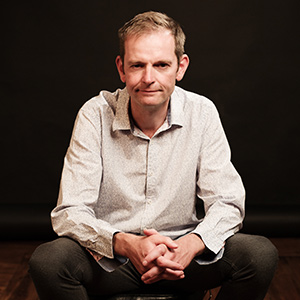
by Kim McCloskey | Sep 1, 2018 | About Storytelling, Featured, Festival
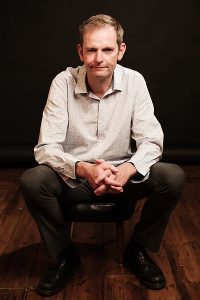 Daniel Morden respects the power of a great story, stories that have stood the test of time, sifted through generations of tellers until the words and message have been polished smooth. When I listen to his Welsh accent carefully crafting tales I fall in love with words all over again. From Greek and Celtic myths to Jack stories to Welsh folktales, Daniel explores it all. He lights up dark places so we can peer into the corners.
Daniel Morden respects the power of a great story, stories that have stood the test of time, sifted through generations of tellers until the words and message have been polished smooth. When I listen to his Welsh accent carefully crafting tales I fall in love with words all over again. From Greek and Celtic myths to Jack stories to Welsh folktales, Daniel explores it all. He lights up dark places so we can peer into the corners.
Get to know him a little better by reading his answers to our five questions.
1. At TimpFest we are very family oriented, will you tell us a little about your family?
I live in Wales with my wife Marion and our two sons, Benjamin (11) and Joseph (9). The boys are both soccer mad. As long as they have a patch of grass where they can kick a ball, they are happy. We have a story club in our home, where adults and children share traditional stories. My eldest son won a contest for his storytelling last year. The boys love festivals. Ben likes discovering new acts. Joe likes discovering new food!
2. If you weren’t a professional storyteller, what would you be doing instead?
Probably a teacher. As my sons grow up, I realise what an important and rewarding job it is. Their teachers have had an enormous influence on them.3. Do you get nervous when you tell stories on stage? If so, what do you do to overcome your fear? If not, what is the key to your fearlessness? I get nervous, particularly in front of thousands of people. What do I do? – I trust the stories. I am just a conduit for a tale that has charmed, chilled, or thrilled audiences for hundreds-sometimes thousands- of years. If I can get out of my own way then the story will work its magic. And just before I go onstage I think of the most inspired teller I ever saw, Brother Blue. He was an extraordinary performer, consumed by delight in words and ideas. I remember his passion and try to copy it.
3. Do you get nervous when you tell stories on stage? If so, what do you do to overcome your fear? If not, what is the key to your fearlessness?
I get nervous, particularly in front of thousands of people. What do I do?- I trust the stories. I am just a conduit for a tale that has charmed, chilled or thrilled audiences for hundreds-sometimes thousands-of years. If I can get out of my own way then the story will work its magic.
4. What is the most embarrassing thing that you have done or has happened to you on stage?

I got the hiccups once….’Once upon a (hic) time….’
And a bonus question: How did you get your start in storytelling?
My Dad read to me and my brother when we were children. I remember him sitting at the end of my bed, I remember the sound of his voice. His words became pictures in my head. We went to Middle Earth, the wild west, Asgard, WW2 Poland: many extraordinary places. A wardrobe wasn’t the portal that took me to Narnia, or a beanstalk to the land of a giant. It was a voice. Every time I tell a story I am attempting to reproduce that experience for the audience. To give them what I had.
You can catch Daniel at the 2018 Timpanogos Storytelling Festival on September 6-8 (that’s next weekend!) at the Ashton Gardens at Thanksgiving Point in Lehi. Utah. For tickets, click here https://timpfest.org/
Listen to a podcast of Daniel Morden at a telling at the National Storytelling Festival in Jonesborough at http://www.9thstory.com/tatterhood/
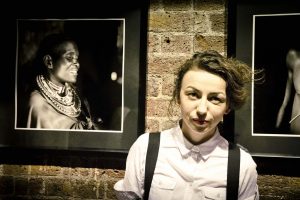
by Kim McCloskey | Aug 19, 2018 | About Storytelling, Featured
 Timpanogos Storytelling Festival is lucky enough to welcome back Clare Murphy, a self-described storyteller, performer, writer, dramaturg, curiosist, teacher, consultant, wanderer, wonderer and maker who has performed around the world. Her lilting Irish accent will remind you that her roots are from a country with one of the richest folktale traditions in the world. I was enchanted by Clare when she came to our festival a few years back and I’ve been excited to see her again ever since. We asked Clare to share some of her insights on her pathway to story.
Timpanogos Storytelling Festival is lucky enough to welcome back Clare Murphy, a self-described storyteller, performer, writer, dramaturg, curiosist, teacher, consultant, wanderer, wonderer and maker who has performed around the world. Her lilting Irish accent will remind you that her roots are from a country with one of the richest folktale traditions in the world. I was enchanted by Clare when she came to our festival a few years back and I’ve been excited to see her again ever since. We asked Clare to share some of her insights on her pathway to story.
Our theme this year is “Pathways to Story.”How would you describe your pathway to becoming a storyteller? Was it a road, a back alley, a fast track, or a meandering trail?
It was something between a back alley, a fast track and straying from the mainpath of life.
Could you tell us about someone who has influenced you on this journey as a storyteller?
My father was an actor, on the side. He didn’t do acting fulltime as it was the 70s and he had four kids. But I saw many of his performances, and got to go backstage and meet the actors. We would help him rehearse his lines and discuss the plays afterwards. My mother is a poet. Our house was filled with books of poetry and stories. She taught me much about how to appreciate language.
I was introduced to storytelling as a world by Liz Weir. She generously invited me to her home and allowed me to shadow her for three days. She went on to encourage me throughout the years to keep going and tell me about a lot of opportunities.
I was also influenced by John Moriarty, an Irish writer and storyteller. His deep connection to myth had a profound affect on me.
What are you passionate about outside of storytelling?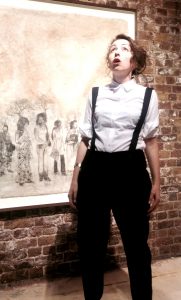
The planet and our responsibility as a part of Nature.
Kindness to each other and other species. I am passionate about art as a means of rehumanising us. I love dancing. and also chocolate, especially dark chocolate (70% + cocoa).
I love the joy of improvisation, the kindness of creativity.
Where does storytelling go from here? How do you see its influence on society?
Storytelling is exactly where it needs to be. It is in every pocket of the world. It has become a buzzword and its’ popularity is only growing. It influences society in every sphere: politics, art, climate change, education, love. People use story to support their ideologies. The hope is that the stories of love, tolerance, compassion, inclusion, kindness that bring together all human beings regardless of gender, politics or religion are the stories that will help us move forward.
What fictional place would you most like to visit?
Ursula K LeGuin’s EarthSea.
*************************************************************
Don’t miss
Clare at the 2018 Timpanogos Storytelling Festival September 6-8 at the Ashton Gardens at Thanksgiving Point in Lehi, Utah. For tickets and volunteer opportunities visit
timpfest.org.
by Kim McCloskey | Aug 14, 2015 | Featured, Festival

I have had the pleasure of listening to Tim Lowry tell stories on three occasions and yet I still sit here trying to figure out what to say about him. I could tell you that he reminds me a bit of a young Donald Davis—and not just because he has been known to wear a bowtie. But, no, it is definitely more than that!
I’ve heard Tim tell stories about family or school that had me laughing so hard that the risk of falling out of my chair was real and then, just a moment later, I was deeply touched by their love and compassion.
I’ve seen him dress in character to tell the story of a Southern gentleman—don’t run away if this is not your thing, it’s not usually my thing either. But he was so charming and full of interesting details that I was sad when the hour was up.
I’ve heard him tell a story in Gullah (also called Sea Island Creole English) that was not only a marvel of tongue twisting to behold but also warmly brought me into the fold of another culture.
I’ve even heard him tell the story using only a kazoo—it was brilliant!
Still, all that somehow falls short of what I want to express about how much entertainment and joy you are in for when you hear Tim Lowry at the Timpanogos Storytelling Festival. I guess mostly I just want to tell you that you must go see him and that when you do you are going to love him—I promise! (this promise holds no monetary value :))
And now for a few words from Tim himself:
1. At TimpFest we are very family oriented, will you tell us a little about your family?
My wife Bonnie and I have been married for 18 years and we have two adopted daughters—Libby is six years old and Bethany is 4 years old. We attend church services regularly where Bonnie sings in the choir and I teach children’s Sunday school. We love to read books! Currently, the girls’ favorite is “Abiyoyo.” A couple night’s ago we were treated to a shadow puppet play of this story. It was very exciting, especially when the giant Abiyoyo ate a frog! We also love gardening. This has been a great year for tomatoes. We just planted pumpkins and are hoping for a whopper! When weather drives us indoors from the garden, we love to dance to old fox trot records on our 1911 Victrola.
2. If you weren’t a professional storyteller, what would you be doing instead?
I’ve always said that when I retire from storytelling I want to be the chaplain for Ringling Brothers, Barnum and Bailey Circus. I would love to be the spiritual advisor for the Greatest Show on Earth. Ringling was my first introduction to show business and I still LOVE the circus. What a great metaphor for life—the highwire (life is all about balance), the lion tamer (life is dangerous, best to know that going in), the acrobats (strength is good, but grace is even better), and clowns (Smile! Count it all joy, and smile!).
3. Do you get nervous when you tell stories on stage? If so, what do you do to overcome your fear? If not, what is the key to your fearlessness?
Nervous? No. Although, I wouldn’t describe myself as fearless (see above comment about lion tamer). What’s the key? Knowing that the audience is human and they are cheering for you. They know you are human and they want you to do well. Be human, be honest, be real and the audience will respond to that. It’s like watching the ice skaters at the Olympics. We cheer for the USA to win, but we all groan when a Russian skater falls. Russians are humans too and we feel their pain. (Of course, we will still deduct a couple points, but nonetheless . . . )
4. What is the most embarrassing thing that you have done or has happened to you on stage?
Hmm, most embarrassing? Years ago, when I was a student in a high-stakes storytelling competition, I got tongue-tied and said “fart” in the middle of a sentence. I was purple with embarrassment. Even the judge laughed (and judges never laugh, unless a Russian falls down. Judges are not human.)
5. The BYU football team will be playing Nebraska the Saturday of the Festival. Who is your pick to win? (This is a “know your audience” moment.)
Ah, football! Southerners go to football games and funerals with equal enthusiasm. We do our best to kill each other at the former, and are polite enough to apologize for having done so at the latter. My condolences to Nebraska.
And one bonus question—because we couldn’t have a Southern gentleman come to our Festival without asking for a bit of Southern advice!
Give us your favorite piece of Southern advice.
Well, I recently was advising a “cumyeh.” (A cumyeh is a person who has just come here, as opposed to someone like me who has always been here. I am a “benyeh.”) This person, who shall remain nameless but they were from off, spotted an alligator in the river and wished they had something to feed it. I reminded them, “NEVUH feed a GATUH!” (That’s not in the Bible, but it should be.)
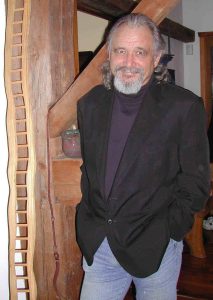
by Kim McCloskey | Aug 11, 2015 | Featured, Festival

If you go to this year’s festival looking for a seasoned storyteller with a rich, resonant voice who focuses on family, then Jim May is your man. I became a fan of Jim when I saw him perform with Megan Wells at the National Storytelling Festival. The story was called “Lime Vanilla Ice” from Ray Bradbury’s book Dandelion Wine and it was a wonderful performance that ended with a standing ovation. I think you are going to find his style comfortable and engaging. We asked him a few questions to help you get to know him.
1. At TimpFest we are very family oriented, will you tell us a little about your family?
Virtually everything I do is rooted in family. I come from a large farming family that has roots in the same small Illinois town of Spring Grove, Illinois, since the 1840’s. My wife, Nan, and I live about twenty minutes from there now and our grandchildren live in the Spring Grove School district as well. I was founding artistic director of the Illinois Storytelling Festival for twenty years. We held the festival in the Spring Grove village park behind my mom’s house. My cousin was our business manager.
I tell stories about my family (especially my granddaughters), and many family members and elders told at our festival at a venue called the “Elder’s Tent,” or “Traditions Tent”—where we featured “kitchen table,” type storytelling—stories told by ordinary folks who had led interesting lives. To this day I don’t think there is a similar stage at any festival in America. Our festival, though it drew 2000-3000 each year is no more. There are several elders circles that meet monthly for people to share their life stories still functioning as one legacy of our festival. The other is our organization, Illinois Storytelling, Inc which sponsors smaller events all over the Chicago land area. I’m best known on the festival circuit for my family stories. One of them, “A Bell For Shorty,” which is a tribute to my father who farmed his whole life, won an EMMY award on Chicago Public Television and is the last story in my book of family stories (THE FARM ON NIPPERSINK CREEK), which won a Public Library Association “Best Book” award.
I’m best known in Chicago land for my presentations to children and families. I am a former elementary school teacher and community college counselor; In my 35yrs of visiting schools and doing family reading nights, literacy nights, etc, I estimate that I have told stories live to about one million children and their families, not including radio and tv appearances. A teacher once referred to my as “a professional grandfather.” I can’t think of a better job title.
I lead an annual workshop to Oaxaca, Mexico every year. We work on stories in the morning and do cultural tours in the afternoon in Oaxaca, a Spanish Colonial city (UNESCO Heritage Site) that the New York Times calls: “The folk art capital of Mexico.” One of the things I do in my workshop/retreat is encourage my adult students to write “legacy letters” to their grandchildren.
I love telling to families and am thrilled that I hear the Timp audience is multi-generational! Congratulations!
2. If you weren’t a professional storyteller, what would you be doing instead?
A teacher. No question. I consider my self a teacher though I left my teaching/counseling job to go full time as a storyteller in 1986.
3. Do you get nervous when you tell stories on stage? If so, what do you do to overcome your fear? If not, what is the key to your fearlessness?
It’s a good nervous, excited really. I try to emulate what Chicago Cubs manager, Joe Maddon, tells his young players, “Don’t let the pressure interfere with the pleasure.”
4. What is the most embarrassing thing that you have done or has happened to you on stage?
I guess it was the Heath Candy Bar festival in Heath, Illinois where I led off first thing in the early morning and there was no one in the audience. I thought—if Miss Indiana (who went on before me) could sing the Star Spangled Banner to “no one” then I should be able to tell a story to “no one”—but singing to yourself is easier than telling a story to yourself (Only storytellers tell themselves stories in the shower).
5. The BYU football team will be playing Nebraska the Saturday of the Festival. Who is your pick to win? (This is a “know your audience” moment.)
This is a split since I am a Big Ten fan and Nebraska is in the Big Ten. But, Jim McMahon took the Chicago Bears to the Super Bowl championship in 1985 and was a star at BYU so I WILL CALL THIS A DRAW.

 Daniel Morden respects the power of a great story, stories that have stood the test of time, sifted through generations of tellers until the words and message have been polished smooth. When I listen to his Welsh accent carefully crafting tales I fall in love with words all over again. From Greek and Celtic myths to Jack stories to Welsh folktales, Daniel explores it all. He lights up dark places so we can peer into the corners.
Daniel Morden respects the power of a great story, stories that have stood the test of time, sifted through generations of tellers until the words and message have been polished smooth. When I listen to his Welsh accent carefully crafting tales I fall in love with words all over again. From Greek and Celtic myths to Jack stories to Welsh folktales, Daniel explores it all. He lights up dark places so we can peer into the corners.



